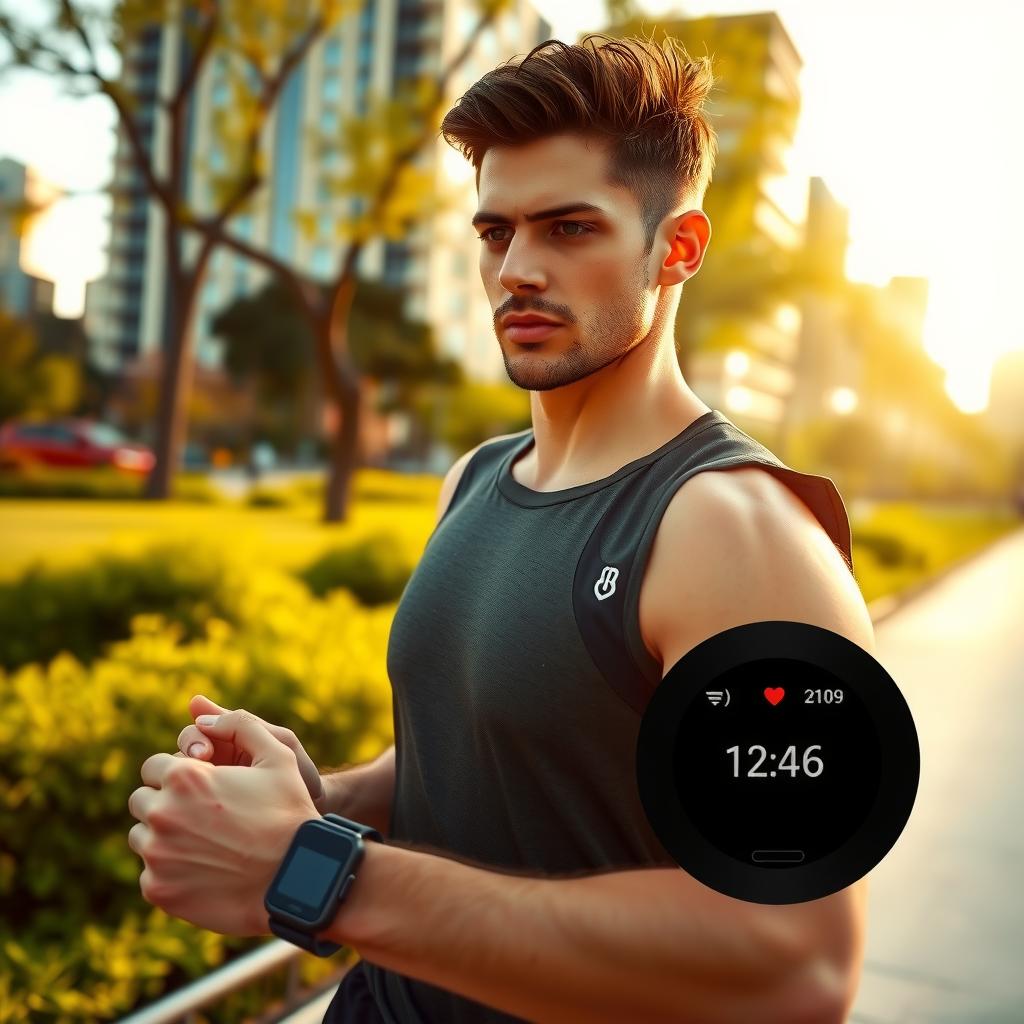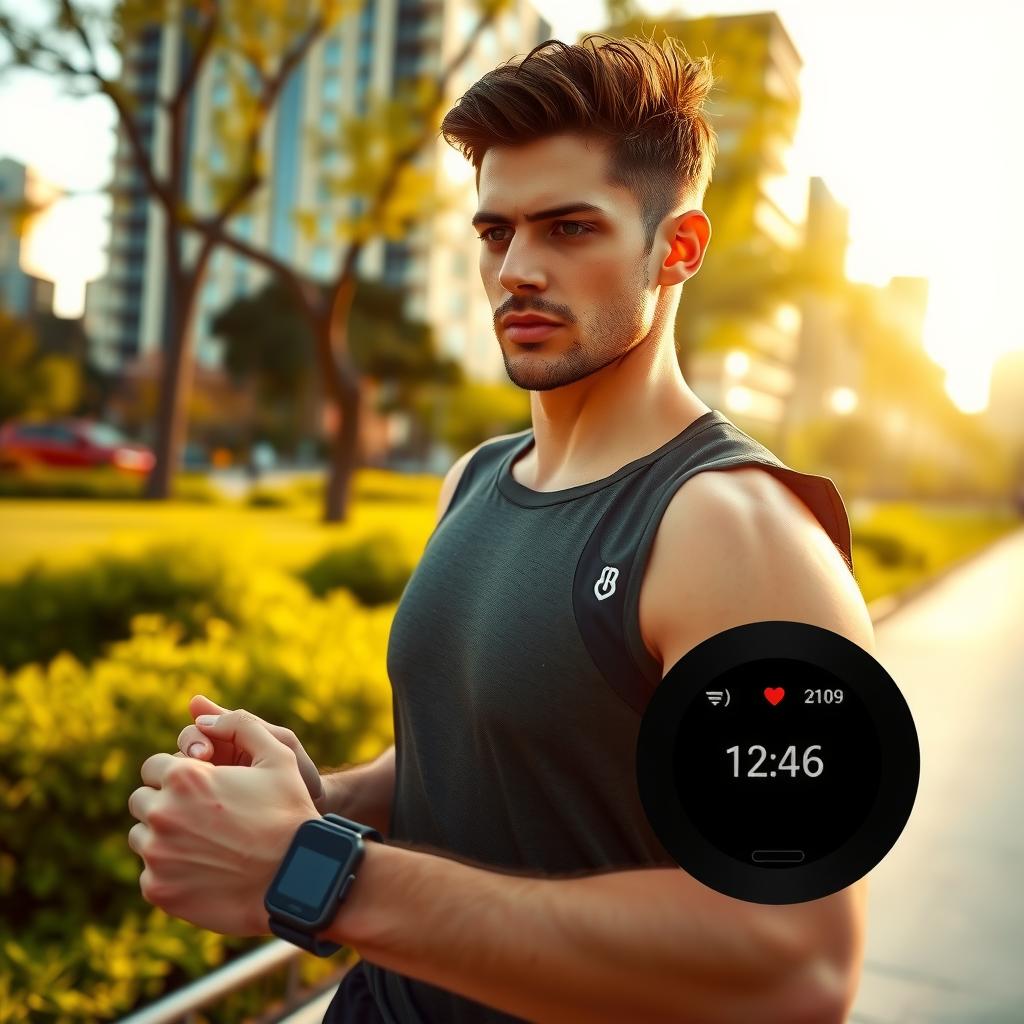In today’s fast-paced world, men in their 30s often find themselves juggling numerous responsibilities—career, family, and personal ambitions—which can make prioritizing health and fitness a significant challenge. As they navigate through this critical decade of life, many are beginning to recognize the importance of maintaining an active lifestyle not just for physical well-being but also for mental clarity and overall wellness. Enter Smart Fitness Trackers, innovative devices designed to seamlessly integrate into daily routines while providing invaluable insights into one’s health metrics. These advanced gadgets have revolutionized how modern men approach fitness, offering real-time data on heart rate, sleep patterns, activity levels, and even stress management.
The core value of smart fitness trackers lies in their ability to empower users with knowledge about their bodies. For men striving toward specific exercise goals or looking to enhance performance analysis during workouts, these tools serve as reliable companions on the journey toward improved physical condition. With features that monitor everything from step counts to calorie burn rates and workout monitoring capabilities tailored for various activities—from running to strength training—these devices allow users not only to track progress but also stay motivated along the way.
As technology continues its rapid advancement in the realm of wellness technology, choosing the right activity tracker becomes increasingly essential for those committed to men’s fitness. This comprehensive review will delve deep into some of the top options available today—highlighting key functionalities that cater specifically to men in their 30s who seek effective solutions for health tracking without compromising on style or convenience. By examining each product’s unique offerings alongside user experiences and expert opinions, readers will gain valuable insights that can guide them towards making informed decisions about which smart fitness tracker best aligns with their individual needs.
With so many choices flooding the market today—from sleek designs that complement everyday wearability to robust models packed with cutting-edge features—it’s crucial for prospective buyers to know what truly matters when selecting a device that supports both current lifestyle demands and future aspirations. Stay tuned as this article reveals everything there is to know about optimizing your approach towards achieving better health outcomes through strategic use of smart fitness trackers.

Key Points:
- User-Centric Design: Tailored Features for Men Smart fitness trackers are designed with the specific needs of men in their 30s in mind. These devices offer features such as heart rate monitoring, sleep tracking, and performance analysis that cater to the unique demands of their lifestyle. By integrating these functionalities into daily routines, smart fitness solutions empower users to take charge of their health while balancing career and family commitments.
- Comprehensive Health Metrics: Tracking Wellness Beyond Exercise The advanced wellness technology embedded in today’s activity trackers ensures comprehensive health tracking. Besides standard metrics like steps taken or calories burned, these smart devices monitor stress levels and recovery times—critical information for anyone focused on achieving long-term exercise goals. This holistic approach not only enhances workout monitoring but also fosters overall well-being.
- Engagement and Motivation: Real-Time Feedback Mechanisms To support sustained engagement with workout regimens, modern fitness trackers provide real-time feedback during physical activities. Users can set personalized targets based on historical data collected by the device, allowing them to track progress effectively over time. This level of interaction is crucial for men striving to enhance their performance through consistent training efforts while navigating life’s many challenges.

The Rise of Smart Fitness Trackers in Modern Health Culture
Exploring the Role of Technology in Men’s Wellness
In today’s health-conscious world, Smart Fitness Trackers have emerged as indispensable tools for modern men, particularly those in their 30s who are increasingly focused on maintaining a healthy lifestyle. These devices serve not only as simple pedometers but as comprehensive health tracking systems that monitor various aspects of physical wellness. Men in this age group often juggle demanding careers and personal responsibilities, making it crucial to find efficient ways to incorporate fitness into their daily routines. By providing real-time data on heart rate, step count, calories burned, and even sleep patterns, Smart Fitness Trackers empower users to take charge of their exercise goals more effectively than ever before.
The significance of these advanced gadgets lies not just in the collection of data but also in how they deliver actionable insights that cater specifically to men’s fitness needs. With features such as workout monitoring and performance analysis tailored for strength training or endurance sports commonly favored by men aged 30 and above, these trackers facilitate targeted improvement strategies. For instance, a user can track his progression over weeks or months through detailed metrics provided by the device—data that is invaluable when aiming for specific targets like increasing muscle mass or improving cardiovascular health. In addition to encouraging consistency with fitness regimens through reminders and challenges from connected apps, Smart Fitness Trackers foster a sense of community among users who share similar wellness objectives.
Enhanced Motivation Through Data-Driven Insights
How Smart Fitness Technology Supports Personal Growth
One compelling aspect of Smart Fitness Trackers is their ability to enhance motivation through data-driven insights. Men seeking an edge in their workouts often find themselves drawn towards technology that provides quantifiable results; hence these devices play a pivotal role by offering continuous feedback on performance levels during exercise sessions. The integration with mobile applications allows for seamless tracking across various activities—from running marathons to lifting weights—making it easier than ever for individuals to visualize progress over time.
Moreover, the social functionalities embedded within many smart fitness platforms enable users to connect with friends or participate in challenges which promote accountability—a vital component when striving toward long-term goals related to men’s fitness. As competition fosters camaraderie among peers engaged in similar pursuits around health monitoring and activity tracking endeavors, participants are likely encouraged not only by individual achievements but also by collective engagement towards better health outcomes overall.
Ultimately, adopting Smart Fitness Trackers presents an opportunity for men navigating their thirties—the age where maintaining optimal physical well-being becomes increasingly critical—to optimize both routine practices and lifestyle choices concerning exercise frequency along with dietary habits via holistic approaches offered within wellness technology ecosystems today.

Key Features to Look For: Maximizing Your Workout Efficiency
Essential Functionalities That Enhance Performance
When it comes to achieving optimal results in fitness, incorporating advanced technology can make a significant difference. Smart Fitness Trackers are at the forefront of this wellness revolution, offering crucial functionalities that promote efficient workout monitoring and performance analysis. One of the most vital features to consider is heart rate monitoring. By continuously tracking heart rates during exercise sessions, these devices enable users to tailor their workouts according to their fitness levels—ensuring they remain within targeted zones for maximum calorie burn and cardiovascular benefits. This feature not only aids in adjusting exercise intensity but also allows individuals engaging in men’s fitness programs or any other tailored regimen to gauge their progress effectively.
In addition to heart rate insights, sleep tracking stands as another essential aspect offered by modern activity trackers. Quality rest is pivotal for recovery and overall health; thus, understanding sleep patterns helps athletes identify areas needing improvement. The data derived from sleep metrics can guide users on when it’s best to ramp up training or take necessary rest days—a balance crucial for reaching long-term exercise goals without risking burnout or injuries.
Stress management capabilities further enhance the utility of these smart devices. With increasing awareness around mental well-being tied closely with physical performance, many Smart Fitness Trackers now include stress level assessments through innovative algorithms that analyze physiological responses such as variability in heart rates. Utilizing this information enables users not just to monitor physical exertion but also manage emotional states that could hinder workout efficiency.
Moreover, integrating all these functionalities into one cohesive system signifies an evolution in wellness technology, enabling comprehensive health tracking without requiring multiple gadgets cluttering up one’s routine. Whether someone maintains a rigorous gym schedule or enjoys casual evening jogs, having access to consolidated data empowers them with knowledge about how each element—from workouts and recovery phases down to quality of sleep—affects their overall performance.
Overall, the combination of heart rate monitoring, sleep tracking, and stress management positions Smart Fitness Trackers as invaluable tools for anyone looking serious about maximizing workout efficiency while navigating the complexities of personal health journeys effectively. As more advancements emerge within this sphere of fitness tech development aimed at improving user experience and accuracy in readings relating directly back toward enhancing daily living standards linked with active lifestyles—the potential outcomes become even more promising for those striving towards personal excellence within their pursuits.
Choosing the Right Tracker: Navigating Options on the Market
Tailoring Smart Fitness Trackers to Individual Goals
When it comes to enhancing men’s fitness, selecting the right fitness tracker can significantly influence one’s exercise journey. As a myriad of options floods the market, understanding which smart fitness trackers align with specific health objectives is crucial. For instance, individuals focused on weight loss may benefit from devices that excel in calorie counting and activity tracking, such as the Fitbit Charge series. These models not only offer comprehensive performance analysis but also provide personalized insights based on user data, ensuring tailored recommendations for optimal progress.
On the other hand, those whose primary aim is strength training might find value in trackers like the Garmin Forerunner, which features advanced workout monitoring capabilities designed specifically for lifting sessions and interval training. The integration of heart rate monitoring during workouts allows users to maximize their intensity levels effectively while minimizing risks associated with overexertion—making these tools invaluable for serious athletes.
Moreover, many modern activity trackers come equipped with wellness technology that extends beyond just physical metrics; they also monitor sleep patterns and stress levels, contributing to overall well-being. Models such as the Apple Watch Series 7 have revolutionized how men approach their health by seamlessly blending style with functionality while providing actionable data about daily activities and long-term trends in health metrics.
As consumers consider their options amidst this vast landscape of smart fitness devices, it’s essential to reflect on personal exercise goals—whether that’s improving cardiovascular endurance or simply staying active throughout a busy workday. By prioritizing features that resonate most closely with individual aspirations—such as GPS capabilities for outdoor runs or guided breathing exercises for mental clarity—users are more likely to commit fully to their chosen routines.
To further assist potential buyers in making informed decisions among various smart fitness tracker models available today, exploring user reviews can shed light on real-world experiences regarding durability and accuracy of tracking functions across different brands and styles. Ultimately, it is through careful consideration of one’s unique lifestyle needs combined with an understanding of what each device offers that men can select a suitable smart fitness tracker poised not just towards achieving immediate goals but fostering sustainable habits over time.
Frequently Asked Questions:
Q: What features should men in their 30s look for in smart fitness trackers?
A: Men in their 30s should prioritize features such as heart rate monitoring, sleep tracking, and performance analysis when selecting smart fitness trackers. These functionalities help tailor workout monitoring to individual health metrics and support overall wellness goals.
Q: How can smart fitness trackers enhance my workout routine?
A: By utilizing activity trackers, users gain access to real-time feedback during workouts, which allows for adjustments based on performance data. This capability facilitates setting personalized exercise goals and maintaining motivation throughout one’s fitness journey.
Q: Are there specific brands of smart fitness trackers recommended for men’s fitness?
A: Yes, several brands offer excellent options tailored for men’s needs. Devices from companies like Garmin and Fitbit incorporate advanced wellness technology that tracks stress levels and recovery times—essential components that aid in optimizing training sessions for enhanced physical performance.



